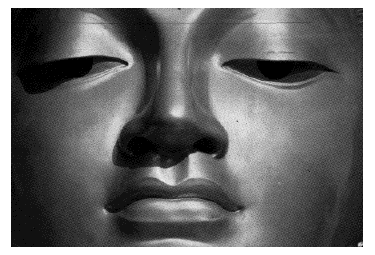And
Psychoanalysis
Dialogues in Psycho-
analysis and Buddhism
Anthony Molino,
Editor
(North Point Press)

Because it's a fat Buddha of a book, 350 pages of fairly small type, it is packed with information, some fairly abstruse, some obvious, some quite worthy. For example, Akihsa Kondo, writing in 1958, tells us that anxiety is not "an exclusive possession of the twentieth century." He tells us that Dogen, the founder of the Soto Sect, saw anxiety as "a reflection of the uncertainty of human existence...Anxiety, then, according to Dogen, is the driving force to enlightenment." The other face of this is if anxiety, pain, grief are indeed the forces that will start us on the path, perhaps western psychotherapy, with all its feel good medications, is leading us away from the initial pain that could lead to some form of enlightenment.
This split is the heart of an essay by Polly Young- The elite ranks of medicine, psychiatry, biology, and sometimes even psychology show an almost uniform lack of interest in the value of suffering. The focus instead is on avoiding or eliminating it. She then brings in a personal observation: As a practicing Buddhist and psychoanalyst, I see it differently. Hardships are the major catalysts for change and development in our lives; they wake us to how we create suffering through our own attitudes and intentions, our actions and relationships. Her treatise (stuck way at the back, when it should be right up front) is an interesting meld of east and west, a study of personal responsibility, resilience, blame, impermanence, the idealization of the self in Western life --- conjoined with The Four Noble Truths. For instance, western psychology uses the model of the "Terrible Parent" and the "Victim Child" to construct a "cure" --- but the author suggests that we need "an ethic of suffering" that will give us a boundary between our own "subjectivity and what lies beyond our control." She cites Jung, who talks about the difference between neurosis and authentic pain. Neurosis arises from the ways in which, conscious or unconscious, we are dissatisfied, thrown off-center, full of childish wishes and complaints. This neurotic suffering distracts us from the authentic and inevitable miseries of life. She then lists the three major questions of life: There are a mountain of insights here having to do with Buddhism, and western malaise, Without the capacity to see how we create a lot of our own difficulties, we are morally and spiritually adrift on all levels of existence. Michael Eigen, another practicing Buddhist and psychotherapist has contributed an essay entitled "One Reality," two case studies of clients of his --- Owen and Jesse --- but, over all, it is replete with an series of insights and a personal warmth that is quite breath-taking. He tells us, for example, of once going to hear Martin Buber. He states that he can't remember what Buber said, but he can remember his singular way of speaking, ...entrancing --- the way he lowered his head into his arms after saying something, waiting for the next revelation. He says that "Buber's death between utterances was anticipatory. One emptied self in order to be ready for the next Thou surge..." And then, Emptiness and the I-Thou moment of impact. We thrive on both. We need more than one breast, more than one eye. His descriptions of his work with Owen and Jesse are leisurely, tolerant, sometimes puzzled. Eigen's observations turn into a hesitant by-play, and his writing becomes poetic with doubt: He [Owen] complains he feels nothing, he is dead. Perhaps he is not dead enough. Perhaps he has died the wrong way --- he so clings to his teacherly self. And then, describing one who is handsome, well spoken, prosperous, successful in teaching Buddhism to younger men: Life had never forced him to feel lowly. Owen had no idea what he missed by not feeling sufficiently wounded or violated. The wounded, broken boys he helps carry brokenness for him. He lives brokenness by proxy... Some of the longer essays included in The Couch and the Tree are totally befuddling. George R. Elder writes on "Psychological Observations on the Life of Gautama Buddha," and it's so heavy with jargon (both psychological and Buddhistic) that one would have to be a master to follow it. The editor's own essay, "Zen, Lacan, and the Alien Ego," is awash in dreadful sentences like, Much in the vein of a Hegelian dialectic whereby subjectivity --- or the emphasized "I" connoting self-consciousness --- is generated in the encounter between two egos, De Martino's reading of Zen takes the peculiarly human community of Desire, in which the interplay of subject- Mercy me! We can only thank the publishers that they restrained Molino to only one essay (and a somewhat more cogent interview) --- and were able to let so many others --- Suzuki, Watts, Eigen, Young-